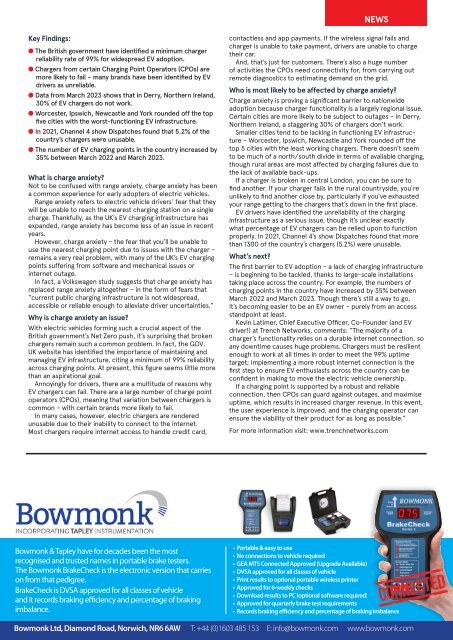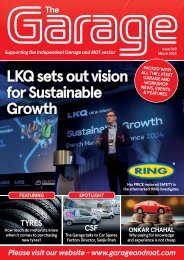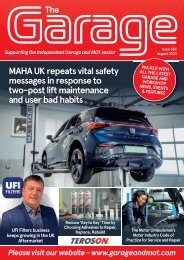The Garage 351
The Garage has established itself as one of the major trade titles in the UK servicing the independent garage sector. With subscription and free circulation it arrives on the principals desk of the independent garage sector every month. The online version of the magazine is emailed to over 10,000 people in the automotive industry every month.
The Garage has established itself as one of the major trade titles in the UK servicing the independent
garage sector. With subscription and free circulation it arrives on the principals desk of the independent
garage sector every month. The online version of the magazine is emailed to over 10,000 people in the
automotive industry every month.
Create successful ePaper yourself
Turn your PDF publications into a flip-book with our unique Google optimized e-Paper software.
NEWS<br />
Key Findings:<br />
● <strong>The</strong> British government have identified a minimum charger<br />
reliability rate of 99% for widespread EV adoption.<br />
● Chargers from certain Charging Point Operators (CPOs) are<br />
more likely to fail – many brands have been identified by EV<br />
drivers as unreliable.<br />
● Data from March 2023 shows that in Derry, Northern Ireland,<br />
30% of EV chargers do not work.<br />
● Worcester, Ipswich, Newcastle and York rounded off the top<br />
five cities with the worst-functioning EV infrastructure.<br />
● In 2021, Channel 4 show Dispatches found that 5.2% of the<br />
country’s chargers were unusable.<br />
● <strong>The</strong> number of EV charging points in the country increased by<br />
35% between March 2022 and March 2023.<br />
What is charge anxiety?<br />
Not to be confused with range anxiety, charge anxiety has been<br />
a common experience for early adopters of electric vehicles.<br />
Range anxiety refers to electric vehicle drivers’ fear that they<br />
will be unable to reach the nearest charging station on a single<br />
charge. Thankfully, as the UK’s EV charging infrastructure has<br />
expanded, range anxiety has become less of an issue in recent<br />
years.<br />
However, charge anxiety – the fear that you’ll be unable to<br />
use the nearest charging point due to issues with the charger –<br />
remains a very real problem, with many of the UK’s EV charging<br />
points suffering from software and mechanical issues or<br />
internet outage.<br />
In fact, a Volkswagen study suggests that charge anxiety has<br />
replaced range anxiety altogether – in the form of fears that<br />
“current public charging infrastructure is not widespread,<br />
accessible or reliable enough to alleviate driver uncertainties.”<br />
Why is charge anxiety an issue?<br />
With electric vehicles forming such a crucial aspect of the<br />
British government’s Net Zero push, it’s surprising that broken<br />
chargers remain such a common problem. In fact, the GOV.<br />
UK website has identified the importance of maintaining and<br />
managing EV infrastructure, citing a minimum of 99% reliability<br />
across charging points. At present, this figure seems little more<br />
than an aspirational goal.<br />
Annoyingly for drivers, there are a multitude of reasons why<br />
EV chargers can fail. <strong>The</strong>re are a large number of charge point<br />
operators (CPOs), meaning that variation between chargers is<br />
common – with certain brands more likely to fail.<br />
In many cases, however, electric chargers are rendered<br />
unusable due to their inability to connect to the internet.<br />
Most chargers require internet access to handle credit card,<br />
contactless and app payments. If the wireless signal fails and<br />
charger is unable to take payment, drivers are unable to charge<br />
their car.<br />
And, that’s just for customers. <strong>The</strong>re’s also a huge number<br />
of activities the CPOs need connectivity for, from carrying out<br />
remote diagnostics to estimating demand on the grid.<br />
Who is most likely to be affected by charge anxiety?<br />
Charge anxiety is proving a significant barrier to nationwide<br />
adoption because charger functionality is a largely regional issue.<br />
Certain cities are more likely to be subject to outages – in Derry,<br />
Northern Ireland, a staggering 30% of chargers don’t work.<br />
Smaller cities tend to be lacking in functioning EV infrastructure<br />
– Worcester, Ipswich, Newcastle and York rounded off the<br />
top 5 cities with the least working chargers. <strong>The</strong>re doesn’t seem<br />
to be much of a north/south divide in terms of available charging,<br />
though rural areas are most affected by charging failures due to<br />
the lack of available back-ups.<br />
If a charger is broken in central London, you can be sure to<br />
find another. If your charger fails in the rural countryside, you’re<br />
unlikely to find another close by, particularly if you’ve exhausted<br />
your range getting to the chargers that’s down in the first place.<br />
EV drivers have identified the unreliability of the charging<br />
infrastructure as a serious issue, though it’s unclear exactly<br />
what percentage of EV chargers can be relied upon to function<br />
properly. In 2021, Channel 4’s show Dispatches found that more<br />
than 1300 of the country’s chargers (5.2%) were unusable.<br />
What’s next?<br />
<strong>The</strong> first barrier to EV adoption – a lack of charging infrastructure<br />
– is beginning to be tackled, thanks to large-scale installations<br />
taking place across the country. For example, the numbers of<br />
charging points in the country have increased by 35% between<br />
March 2022 and March 2023. Though there’s still a way to go,<br />
it’s becoming easier to be an EV owner – purely from an access<br />
standpoint at least.<br />
Kevin Latimer, Chief Executive Officer, Co-Founder (and EV<br />
driver!) at Trench Networks, comments: “<strong>The</strong> majority of a<br />
charger’s functionality relies on a durable internet connection, so<br />
any downtime causes huge problems. Chargers must be resilient<br />
enough to work at all times in order to meet the 99% uptime<br />
target; implementing a more robust internet connection is the<br />
first step to ensure EV enthusiasts across the country can be<br />
confident in making to move the electric vehicle ownership.<br />
If a charging point is supported by a robust and reliable<br />
connection, then CPOs can guard against outages, and maximise<br />
uptime, which results in increased charger revenue. In this event,<br />
the user experience is improved, and the charging operator can<br />
ensure the viability of their product for as long as possible.”<br />
For more information visit: www.trenchnetworks.com<br />
Bowmonk & Tapley have for decades been the most<br />
recognised and trusted names in portable brake testers.<br />
<strong>The</strong> Bowmonk BrakeCheck is the electronic version that carries<br />
on from that pedigree.<br />
BrakeCheck is DVSA approved for all classes of vehicle<br />
and it records braking efficiency and percentage of braking<br />
imbalance.<br />
• Portable & easy to use<br />
• No connections to vehicle required<br />
• GEA MTS Connected Approved (Upgrade Available)<br />
• DVSA approved for all classes of vehicle<br />
• Print results to optional portable wireless printer<br />
• Approved for 6-weekly checks<br />
• Download results to PC (optional software required)<br />
• Approved for quarterly brake test requirements<br />
• Records braking efficiency and percentage of braking imbalance<br />
Bowmonk Ltd, Diamond Road, Norwich, NR6 6AW T: +44 (0)1603 485 153 E: info@bowmonk.com www.bowmonk.com<br />
10,11 Charging Anxiety.indd 2 30/05/2023 12:38

















